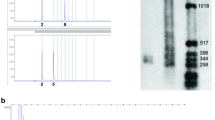Abstract
Epileptic seizures are usually considered as rare and marginal symptoms in late stages of Huntington chorea. We report the extraordinary course of disease in a patient in whom epilepsy developed many years before the onset of Huntington disease became apparent.
The patient's mother had died from Huntington chorea. The patient suffered from focal epilepsy (temporal lobe epilepsy) with generalised tonic-clonic and psychomotor seizures since the age of seven. During the last few years the epilepsy was therapy resistant. Chorea began gradually between 20 and 25 years of age when he gave up his academic studies. Huntington chorea was diagnosed through direct DNA analysis (19±1 and 50±1 CAG copies). For a long period of time, ataxia and dysarthria were the predominant clinical signs. Later, severe psychiatric symptoms (delusions of grandeur, aggressive outbursts, severe self-neglect, dementia) developed while choreatiform movements were seen only in late stages. The patient died at the age of 37.
Epileptic seizures in the context of Huntington chorea usually appear only in the late course of disease. However, in cases of chorea presenting already in childhood or adolescence, epileptic seizures can occur as early symptoms. In our patient the onset of epilepsy was unusually long before the onset of typical symptoms of Huntington disease. Early onset Huntington chorea is frequently associated with a high number of CAG repeats as well as with paternal inheritance. Both were not the case in our patient. The question remains unsolved, therefore, whether our patient's epilepsy was an early symptom of chorea or whether we rather saw an accidental co-occurrence of both diseases.
Zusammenfassung
Epileptische Anfälle gelten als eher seltenes und marginales Symptom späterer Erkrankungsstadien einer Chorea Huntington. Wir berichten über den ungewöhnlichen Krankheitsverlauf eines Patienten, bei dem sich die Epilepsie viele Jahre vor dem erkennbaren Ausbruch der Huntington-Erkrankung manifestierte.
Die Mutter des Patienten war an einer Chorea Huntington verstorben. Der Patient litt seit dem 8. Lebensjahr an einer fokalen Epilepsie (Temporallappenepilepsie) mit generalisierten tonisch-klonischen und psychomotorischen Anfällen, die in den letzten Jahren therapieresistent verliefen. Die Chorea begann schleichend zwischen dem 20. und 25. Lebensjahr, als er sein Studium aufgeben musste. Der Nachweis einer Chorea Huntington erfolgte mittels direkter DNA-Diagnostik (19±1 und 50±1 CAG-Kopien). Klinisch standen lange Zeit Ataxie und Dysarthrie ganz im Vordergrund, dann traten schwere psychiatrische Auffälligkeiten (Größenwahn, fremdaggressive Durchbrüche, schwere Verwahrlosung, Demenz) hinzu, während choreatiforme Bewegungsmuster erst im Spätstadium manifest wurden.
Der Patient verstarb im Alter von 37 Jahren.
Epileptische Anfälle treten im Rahmen einer Chorea Huntington eher als Symptom späterer Erkrankungsstadien auf, lediglich bei der sich im Kindesalter manifestierenden Chorea gehören epileptische Anfälle zu den frühen Symptomen. Bei unserem Patienten lag der Beginn der Epilepsie ungewöhnlich weit vor dem der typischen Chorea-Huntington-Symptome. Die früh beginnende Chorea Huntington zeigt häufig eine sehr hohe Zahl von CAG-repeats sowie eine paternale Vererbung, was beides bei unserem Patienten nicht zutraf. Deshalb bleibt offen, ob die Epilepsie hier tatsächlich ein Frühsymptom der Chorea war, oder ob es sich um ein zufälliges gemeinsames Auftreten der beiden Erkrankungen handelt.
Similar content being viewed by others
Literatur
Bengel D, Supprian T et al (1997) Koinzidenz von Chorea Huntington und Epilepsie. Nervenarzt 68(3):270–273
Gambardella A, Muglia M et al (2001) Juvenile Huntington's disease presenting as progressive myoclonic epilepsy. Neurology 57(4):708–711
Author information
Authors and Affiliations
Corresponding author
Rights and permissions
About this article
Cite this article
Huber, B. Eine ungewöhnliche Kombination aus Chorea Huntington und Epilepsie. Z. Epileptol. 21, 149–152 (2008). https://doi.org/10.1007/s10309-008-0313-1
Received:
Accepted:
Published:
Issue Date:
DOI: https://doi.org/10.1007/s10309-008-0313-1




